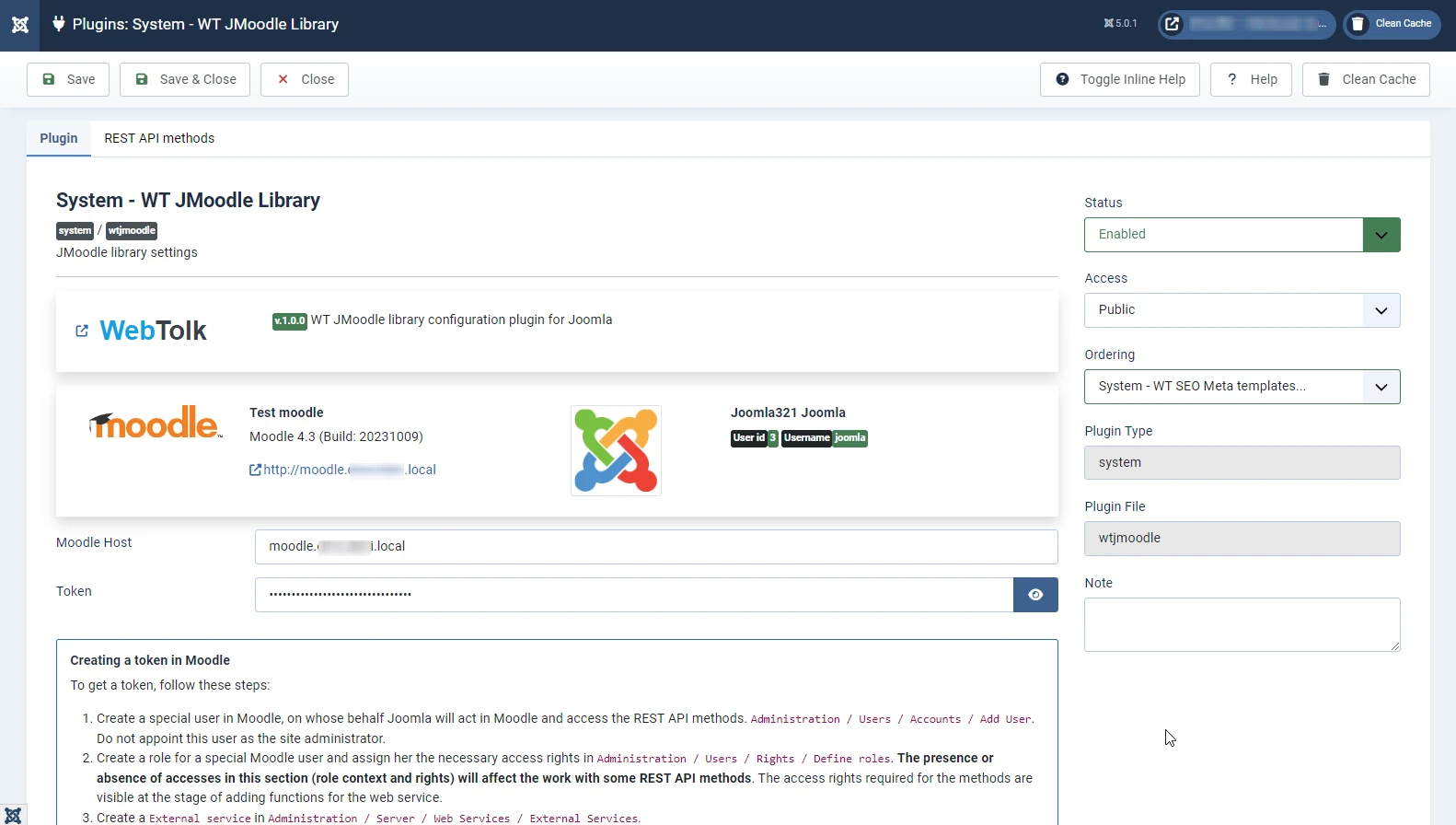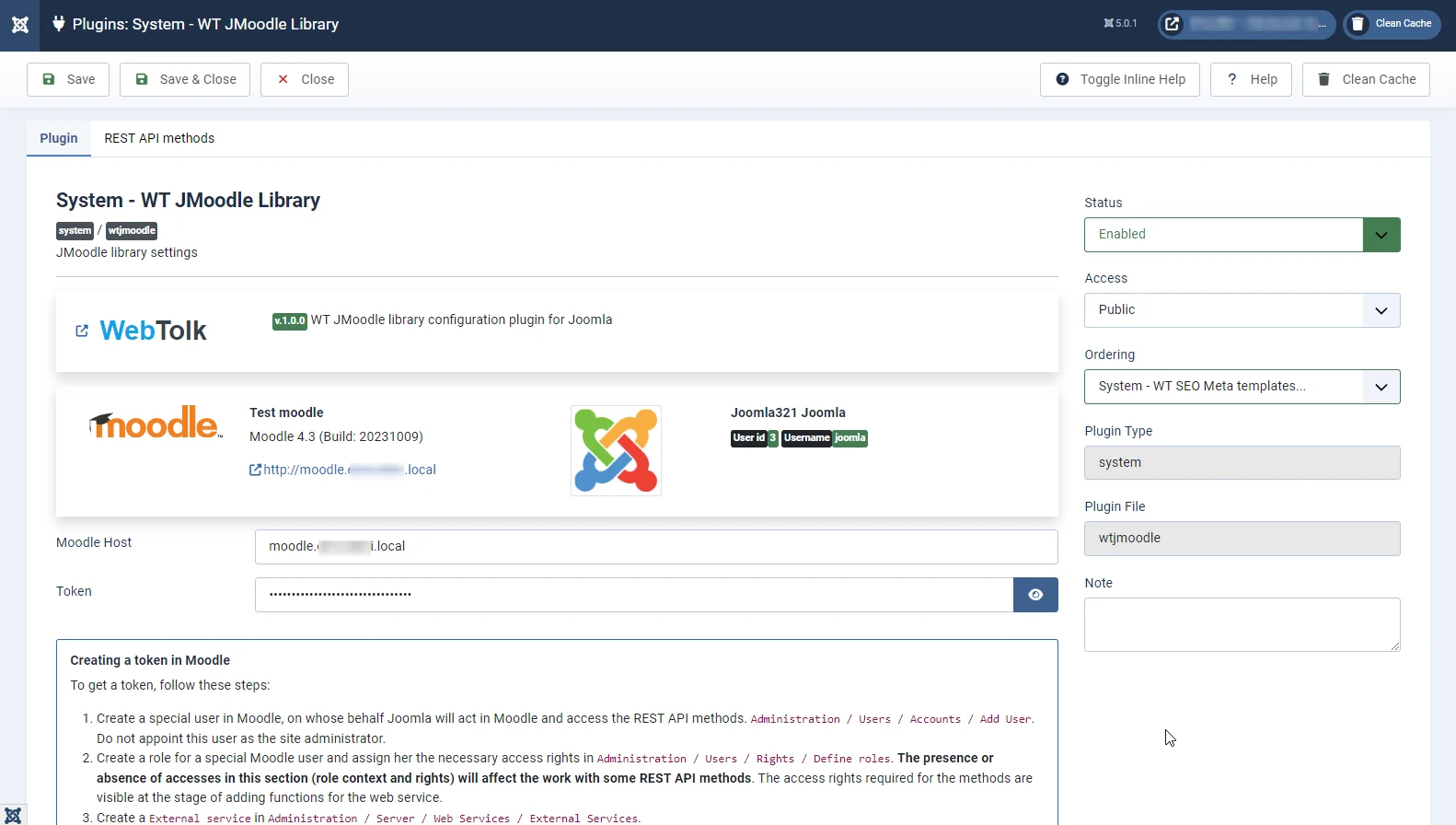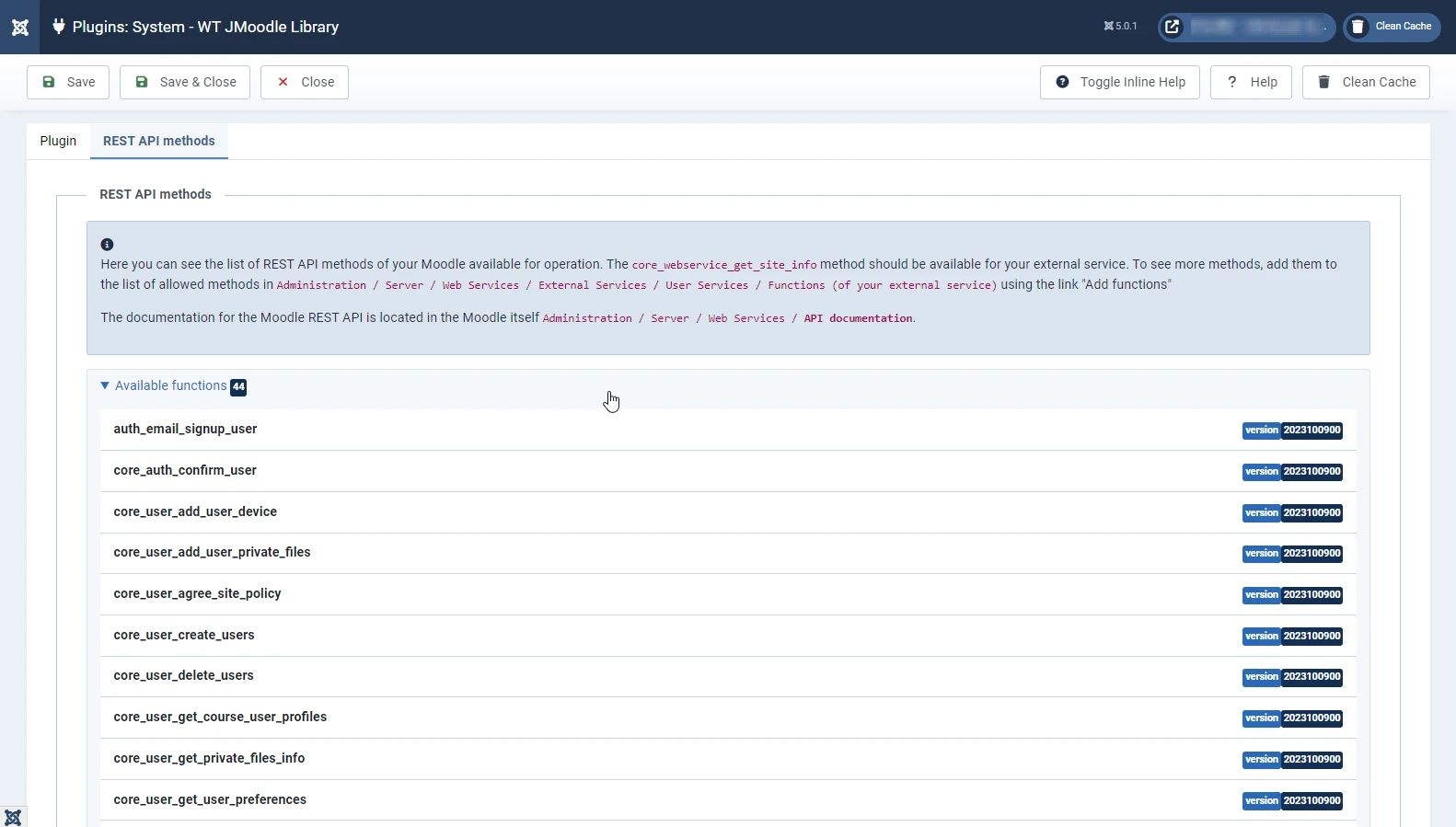
WT JMoodle library
Native Joomla 4 / Joomla 5 PHP library for working with the Moodle REST API.
Description
Native Joomla 4 / Joomla 5 PHP library for working with the Moodle REST API.
How to use Moodle connetction library in Joomla
Video (Russian language)
Install and configure Moodle and Joomla
- Install a JMoodle library in Joomla
- Go to your Moodle and create token for Joomla
- Set this token to JMoodle library in system plugin settings
How to create a Moodle web services token for Joomla
To get a token, follow these steps:
- Create a special user in Moodle, on whose behalf Joomla will act in Moodle and access the REST API methods.
Administration / Users / Accounts / Add User. Do not appoint this user as the site administrator. - Create a role for a special Moodle user and assign her the necessary access rights in
Administration / Users / Rights / Define roles. The presence or absence of accesses in this section (role context and rights) will affect the work with some REST API methods. The access rights required for the methods are visible at the stage of adding functions for the web service. - Create a
External serviceinAdministration / Server / Web Services / External Services. - After creating an external service from the list of external services, go to the
functionsof the created service and add the REST API methods necessary for the integration to work. Add thecore_webservice_get_site_infomethod in order to see in Joomla that the integration really works, as well as a list of methods available for the REST API. - Create a
tokeninAdministration / Server / Web Services / Tokensfor a specially created user from under whom Joomla will access the REST API.
If you have done everything correctly, you will see a list of available Moodle REST API methods in your Joomla.

How to make a request to Moodle webservices from Joomla via REST API?
<?php
use Webtolk\JMoodle\JMoodle;
$moodle = new JMoodle();
/**
* Request method.
*
* @param string $method Moodle REST API method
* @param array $data data for Moodle REST API method
*
* @return array
*/
$result_jmoodle = $moodle->request('core_webservice_get_site_info');
Look at file of Joomla Form field like MoodleinfoField, here is an example:
<?php
use Webtolk\JMoodle\JMoodle;
$moodle = new JMoodle();
// Check can we do the request to Moodle - have we Moodle credentials filled?
if (!$moodle::canDoRequest())
{
return ''; // or false or other that you need
}
// Make the request to Moodle webservice method. Look at Moodle docs
// Returns array with Moodle data or an error object
$result_jmoodle = $moodle->request('core_webservice_get_site_info');
// Check if we have an empty response for core_webservice_get_site_info method
if (count($result_jmoodle) == 0)
{
return '<div class="alert alert-danger row">
<div class="col-2 h1">400</div>
<div class="col-10">There is no Moodle host response</div>
</div>';
}
// Check if we have an error data from JMoodle library
if (isset($result_jmoodle['error_code']) && !empty($result_jmoodle['error_code']))
{
return '<div class="alert alert-danger row">
<div class="col-2 h1">' . $result_jmoodle['error_code'] . '</div>
<div class="col-10">' . $result_jmoodle['error_message'] . '</div>
</div>';
}
// Check if we have a wrong reponse from Moodle, but HTTP code is 200
if (!array_key_exists('sitename', $result_jmoodle) || empty($result_jmoodle['sitename']))
{
return '<div class="alert alert-danger row">
<div class="col-2 h1">400</div>
<div class="col-10">Moodle return wrong response</div>
</div>';
}
// All OK, we can access to Moodle data in Joomla
$result_jmoodle['sitename']; // 'My awesome test Moodle'
$result_jmoodle['release']; // 'Moodle 4.3 (Build: 20231009)'
$result_jmoodle['userpictureurl']; // 'Here your special Joomla user in Moodle picture url'
// etc...
Making a request for your own Moodle entry point
Some extensions for Moodle allow you to access them bypassing the REST API interface. To do this, the customRequest() method has been added to the library.
<?php
use Webtolk\JMoodle\JMoodle;
$moodle = new JMoodle();
$data = [
'param' => 'value'
];
$file = JPATH_SITE.'/123.txt';
$curl_options = [
CURLOPT_COOKIEJAR => $file,
CURLOPT_RETURNTRANSFER => 1,
CURLOPT_HEADER => 1,
CURLOPT_SSL_VERIFYPEER => false
];
$moodle_reposnse = $moodle->customRequest('/path/to/file/in/moodle.php', $data, 'POST', $curl_options);Library structure
This library is designed for Joomla developers. The library files are located in libraries/Webtolk/JMoodle/src.
- src
-- Fields
-- Helper
-- Interfaces
- JMoodle.php
- JMoodleClientException.php
Fields
Fields - there are Joomla native Form (ex. JForm) fields, which you can use in your extensions: modules, plugins, components etc. This folder will be fill up.
Your form XML example (Joomla 4 and Joomla 5):
Moodleinfo Joomla field
This field will display info about your Moodle. If you see that info - your connection between Joomla and Moodle is fine.
<field addfieldprefix="Webtolk\JMoodle\Fields"
type="moodleinfo"
name="moodleinfo"/>
Moodlerestapimethods Joomla field
This field displays you all available form Joomla Moodle REST API methods for token you have specify.
<field addfieldprefix="Webtolk\JMoodle\Fields"
type="moodlerestapimethods"
name="moodlerestapimethods"
collapsible="true"
/>
A collapsible="true" attribute is optional. If it is not set you will see whole Moodle REST API methods list.
Helper
Helper is a folder where helpers for Moodle webservices methods are placed. These helpers check the structure of the transmitted data and data types before making a request to Moodle. If the structure and data types do not match the Moodle documentation, an error object with an error description is returned.
Helper class name
The name of the helper class is formed dynamically in the method getMethodHelperClass based (file: libraries\Webtolk\JMoodle\src\JMoodle.php) on the name of the requested REST API Moodle method according to the following logic:
- get the Moodle webserivec method name
- explode it to parts by undescore
_So the helper class forcore_webservice_get_site_infowill found in Webtolk\JMoodle\Helper\ Core\Webservice namespace - Webtolk\JMoodle\Helper\Core\Webservice. If the class name contains the wordSelf, we rename it toMySelf. So Helpers fo Moodle webservicesenrol_self_...methods are placed in Enrol**My**Self namespace - Webtolk\JMoodle\Helper\Enrol\MySelf - because the word Self is reserved in PHP.
Empty method helper class example
<?php
namespace Webtolk\JMoodle\Helper\Core\Create;
defined('_JEXEC') or die;
use Webtolk\JMoodle\Interfaces\MethodHelperInterface;
class Create implements MethodhelperInterface
{
public function checkData(string $method, array $data = []): array
{
return $data;
}
}
Helper class example for Core\User namespace
<?php
namespace Webtolk\JMoodle\Helper\Core\User;
defined('_JEXEC') or die;
use Webtolk\JMoodle\Interfaces\MethodHelperInterface;
class User implements MethodhelperInterface
{
public function checkData(string $method, array $data = []): array
{
// Call a check method
return $this->$method($data);
}
/**
* Check data for core_user_create_users Moodle REST API method
*
* @param array $data Users data for create in Moodle
*
* @return array $data array if check is success. Array with error description if check is false
*
* @since 1.0.0
*/
private function core_user_create_users(array $data = []): array
{
if (!array_key_exists('users', $data))
{
return [
'error_code' => 400,
'error_message' => 'Empty users array specified'
];
}
$users = $data['users'];
if (count($users) < 1)
{
return [
'error_code' => 400,
'error_message' => 'Empty users array specified'
];
}
foreach ($users as $user)
{
if (!array_key_exists('createpassword', $user) || $user['createpassword'] != 1)
{
if (!array_key_exists('password', $user) || empty($user['password']))
{
return [
'error_code' => 400,
'error_message' => 'Invalid password: you must provide a password, or set createpassword.'
];
}
}
if (!array_key_exists('username', $user) ||
!array_key_exists('email', $user) ||
!array_key_exists('firstname', $user) ||
!array_key_exists('lastname', $user) ||
empty($user['username']) ||
empty($user['email']) ||
empty($user['firstname']) ||
empty($user['lastname'])
)
{
return [
'error_code' => 400,
'error_message' => 'One of the required fields (username, email, firstname, lastname) for user which you are creating are not specified or empty'
];
}
}
return $data;
}
// And so on...
}
And so on for Moodle webservices methods:
- core_user_update_users
- core_user_delete_users
- core_user_get_users
- core_user_get_users_by_field
- core_user_add_user_device
- core_user_add_user_private_files
- core_user_agree_site_policy
- core_user_get_course_user_profiles
- core_user_get_private_files_info
- core_user_get_user_preferences
- core_user_remove_user_device
- core_user_search_identity
- core_user_set_user_preferences
- core_user_update_picture
- core_user_update_user_device_public_key
- core_user_update_user_preferences
- core_user_view_user_list
- core_user_view_user_profile
Ready-made helper methods
- Webtolk\JMoodle\Helper\Core\User
- Webtolk\JMoodle\Helper\Enrol\Manual
Interfaces
This folder contains interfaces for the library, which fix the structure of methods and their data for correct operation.
Joomla
- Extension type:
- Package
- Package composition:
- Library, Plugin
- Joomla version:
- 5.0.0, 5.0.2

